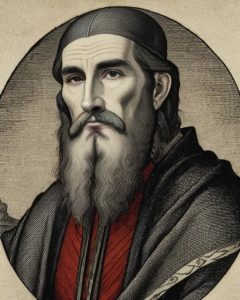The renowned Venetian traveler, Marco Polo, stands out as a pivotal figure in the annals of exploration and cross-cultural exchange. His expeditions into the remote realms of Asia during the 13th century not only expanded European knowledge of geography but also heightened cultural sensitivity through his meticulous narratives. This essay endeavors to delve into the life and journeys of Marco Polo, exploring his profound impact on global exploration and intercultural communication.
At the core of Marco Polo’s story lies his remarkable odyssey from Venice to the court of the formidable Kublai Khan in China, a tale that endures as one of the most remarkable sagas of exploration in human history. Born into a family of merchants in 1254, Polo embarked on a transformative quest at a mere age of 17, embarking on a voyage that lasted over 24 years, traversing the vast expanses of Asia. Chronicled in his seminal work “The Travels of Marco Polo,” his adventures stood as a guiding light, illuminating new paths for cultural interchange and laying the foundation for future generations of adventurers.
Raised amidst the bustling trade routes of the Mediterranean, Marco Polo was nurtured in a family of seasoned Venetian merchants, including his father Niccolò and uncle Maffeo, who had themselves journeyed eastward, regaling young Polo with stories of distant lands and lucrative trade opportunities that ignited his passion for exploration.
In the pivotal year of 1271, accompanied by his father and uncle, Marco Polo set forth on a monumental journey to the East. Crossing the perilous terrains of Central Asia and navigating the Silk Road, the Polo trio encountered a rich tapestry of diverse cultures, languages, and customs. Their arrival at the magnificent court of Kublai Khan in China marked the commencement of Marco’s immersive voyage in the Far East.
Acknowledging Marco Polo’s exceptional intellect, linguistic skills, and cultural adaptability, Kublai Khan entrusted him with pivotal diplomatic assignments across his vast empire, appointing him as an envoy. This esteemed position provided Marco with rare insights into the inner workings of the Mongol Empire, enabling him to meticulously document its practices, governance system, and abundant riches.
Upon his return to Venice in 1295, Marco Polo’s captivating tales of his adventures enthralled audiences across Europe. Collaborating with the renowned scribe Rustichello da Pisa, Polo penned his extraordinary experiences in “Il Milione” or “The Travels of Marco Polo.” This seminal work offered Europeans a comprehensive view of the wonders of Asia, depicting the allure of silk, spices, paper currency, and the famed cities of Cathay (China) and Cipangu (Japan).
Marco Polo’s legacy extends beyond mere geographical exploration; his expeditions spurred cultural curiosity and nurtured interactions between distant civilizations. His stories inspired subsequent generations of explorers, such as Christopher Columbus, who carried a copy of “The Travels of Marco Polo” on his maritime ventures. Furthermore, Polo’s accounts proved invaluable to mapmakers and geographers, shaping the early cartography of the world.
In conclusion, Marco Polo’s enduring legacy as an explorer, diplomat, and storyteller reverberates through the corridors of time. His bold journey to the East and the subsequent dissemination of his travels through “The Travels of Marco Polo” served as a bridge connecting disparate worlds and enriching human understanding of global diversity. Reflecting on his lasting influence, Marco Polo emerges as a true pioneer of exploration and intercultural dialogue, a legacy that transcends temporal and geographical confines.

